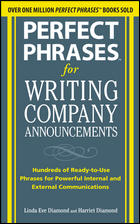Harriet Diamond - Common Pronoun Confusion
Pronouns are not really complicated. Often, the method of teaching pronouns complicates understanding. Each category of pronoun has a specific role. They cannot do one another’s job.
Many people believe that certain pronouns
sound better than others, so they use them indiscriminately. For example, subject pronouns, those that act
(I., he, she, they, and we), cannot be objects, or acted
upon. Object pronouns, those acted upon
(me, him, her, them, and us), cannot act. You can be considered a universal
pronoun. It is singular: I’ll call you. It is plural: I’ll call you (all nine
of you). It acts: You can’t be serious! And it is acted upon: The gift is for you.
While I'll be covering additional pronoun misuses in a future blog, following are examples of the most common pronoun errors:
Incorrect: The Advisory Committee presented awards to Ariel and I.
Correct: The Advisory Committee presented awards to Ariel and me.
Explanation: Clearly, you would not say, “The Advisory Board presented the award to I.” Your being joined by Ariel does not change the fact that you are receiving the award; you are the object. Just as the Committee would “present the award to me; it would present it to Ariel and me.
Incorrect: Mica and me are going to the conference.
Correct: Mica and I are going to the conference.
Explanation: The same rule of “going it alone” applies. If you were going to the conference alone, you would say: “I am going to the conference.” Mica’s joining you does not change that you are the actor, the performer, the subject of the sentence, with or without Mica. You know that “Me is going to the conference” is incorrect. So is “Mica and me are going…”
Finally, we have the ever-confusing use of who and whom. This problem is easy to solve. Who is a subject pronoun (an actor) and whom is an object pronoun (acted upon). A foolproof way to determine whether who or whom is the correct choice is the question test. Look at the examples below:
Incorrect: Whom wrote that analysis?
Correct: Who wrote that analysis?
Explanation: If the answer is he, the question is, “Who?” He (she, we, they) wrote it.
Incorrect: Who did Tamir invite to the film’s opening?
Correct: Whom did Tamir invite to the film’s opening? He invited him (her, us, them).
Explanation: If the answer is him, the question is “Whom?” Whom goes with the “m” words: him, them, and their companions her and us.









